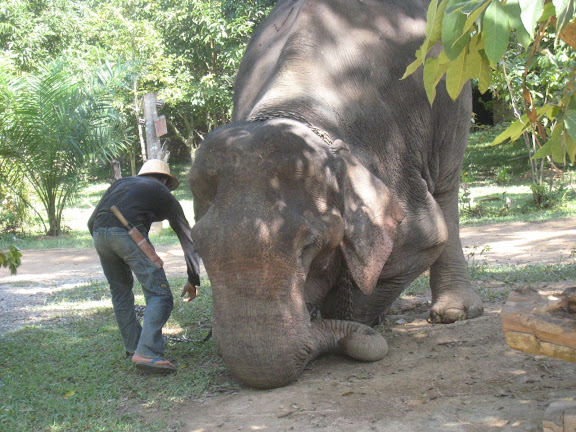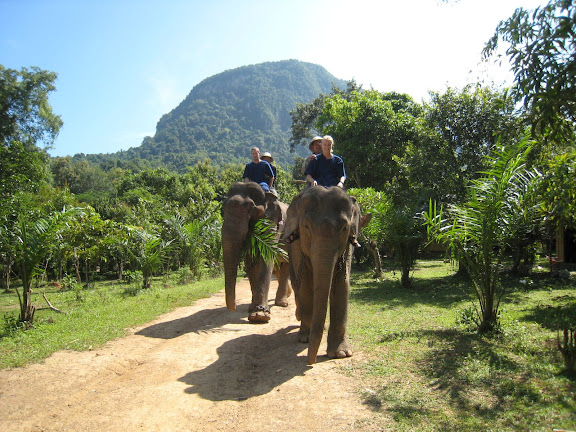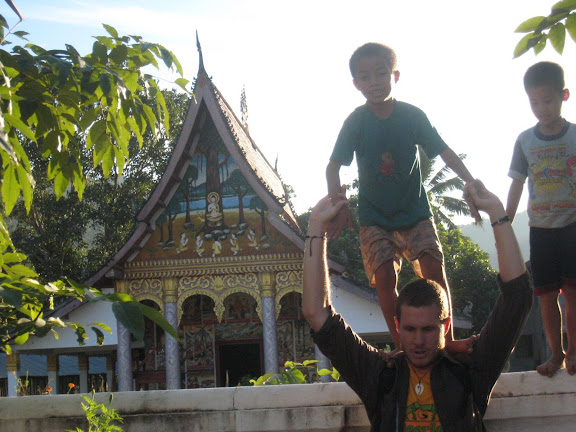While we loved the places we have visited in Thailand, we have found them to be well-
touristed and sometimes with lack of access to local culture. Everywhere we have been, there are an assortment of food choices (especially Western), tourist agencies on every corner, and shops and touts trying to sell you souvenirs at every turn. After our couple days in Chang Mai, we were longing to get off the main tourist track and see a bit of the quieter side of Thailand...
After taking a mini-bus to the town of
Feng, we hopped in a
sawngthaew (basically a small pick up truck with bench seats in the back) to the small river town of
Tha Ton along the Northern Thai border. The truck ride was the most interesting...aside from us, there were only locals jumping on and off at points along the way. At one point, the old granny sitting next to Eric greedily extended her hand for a Halls cough drop from the package I'd taken from my bag. I of course didn't mind giving her one, but she didn't indicate a thank you and soon got told off in Thai by her granddaughter sitting across from her. It was slightly amusing.
We went to
Tha Ton because we had heard you could hire a

bamboo raft to take you down the Mae Nam
Kok river to the town of Chang
Rai. This is actually a well
touristed area, however, it's low season so very few tourists were to be found. Without 4 people for the bamboo raft, the price was too expensive, so we decided to wait until the following day to take the public boat. We showed up the next morning at 11AM to buy our public boat tickets, but they said the boat wouldn't go unless they had 5 people. We waited until the departure time of 12:30 and decided we would pay the additional fare to take it anyway - what could we do?...we wanted to take the boat. At the last minute, one lone tourist showed up - a guy from Belgium - and agreed to split the fare three ways, which was better than two.
The boat trip was relaxing and scenic...we stopped at two
Lahu Villages along the way before arriving to the Hot Springs - not more than a scalding hot and muddy pond. Eric and I had picked up a brochure for a guest house 3 km walk from the hot springs up in a hill tribe village, so we decided to disembark here. The brochure just said to follow the signs to "
Akha Hill House"...no problem, right?
After asking directions, we saw the first sign...excellent, on the right track. Afte

r another 10
mins walking along a dirt road up and down hills, we saw a second sign...and a village up in the distance. By this point our 40-50 pound bags were starting to feel quite cumbersome, but it didn't seem much further, so no sweat. By the time we arrived to the village, my legs were
starting to ache, but we felt relief because we'd arrived. Not so. We asked the villagers where the "
Akha Hill House" was and they just kept pointing up the road, which by this point was narrowing into a small path. We came to the last thatched cottage at the top of the village and asked the old woman washing her clothes on her porch about the
Akha Village and she nodded in recognition, pointed upwards on the steep dirt path and made a sound and hand gesture to indicate it was a long long way...then she smiled, and laughed. We didn't fully believe her when she said it was a LONG way, we thought it had to be just up the hill. Again, not so.
By this point, we had acquired a dog from the local village who seemed quite happy to tromp

along ahead and beside us for our journey. Her presence was actually quite calming (knowing that we couldn't be lost because the dog was sure to know the way) as we continued up the path that kept getting more ambiguous. There were no longer any signs and we had no idea if we were heading in the right direction considering the path went into the jungle and we were surrounded on both sides by head high grass and shrubs. We finally came across another villager and she indicated again to keep going...so we did. We finally came to a clearing and a cross roads. At this point, it was nearing 5PM (it gets dark between 6-6:30), my hips were bruised from the weight of my bag and Eric had to dole out continual encouragement to keep my legs moving up the steep path. We discussed the situation and decided, worse comes to worse, we can go back to the first village and ask to stay there. For the time being, we'd make an educated guess (due to the lack of any signage) and went left. Our dog hopped happily along.
Another 10-15 minutes...and another cross roads. Eric went to explore up left and I stayed put and listened. I thought I heard rushing water in the distance (towards the right path) and since the village was meant to be near a waterfall, we chose right.
Another 10-15 minutes...and yet another cross roads. Shoot! We were both feeling a little uncertain now, though Eric maintained optimism and went to explore up to the left again. And low and behold, down below he could see the village. He came back down and we continued to the right and after another 10 minutes strode into the village with our bags and our dog. The local dogs were not a fan of our new friend, but she stayed loyal and near us for protection. (In fact she stayed with us all evening and slept overnight on our porch. It wasn't until the next morning when one of the villagers threatened her with a sling shot - shame on him! - that she took off for her real home).
As we entered the village, we were welcomed by smiles from the people, all pointing us in the right direction and came upon a group of villagers chatting near the guest house entrance. There were no other guests at the moment, so they offered us a VIP room (i.e., jungle bungalow) for 350
bhat ($11) per night. FINALLY, we took off our bags and were able to relax and have a nice meal. If nothing else, a hike like this convinces you to get rid of some of the crap you pick up and carry along in your bag - time to lighten our loads again! After dinner, we went to explore the village, play with the local children and chat with some of the younger people and tour guides who spoke some English. We felt very at home here and the setting was amazing.
The next day, we decided to do a jungle trek with our guide
Apa. The first part of the hike was

all uphill (yippee!) to see the waterfall and then around the mountain and down into another valley. We stopped early at 10:30AM for lunch because
Apa was going to prepare our lunch using bamboo cooking. He first went down to the river to cut a few large shoots of bamboo. He cut them into smaller 3-4 foot sections and we helped carry them back to our picnic spot (at the base of a rice hill). Over the next hour, he made us 3 bamboo cups, 3 sets of chopsticks and 3 bamboo cylinders for the food. He chopped up lettuce, cabbage, onion, tomatoes, lemon grass and spring o

nion and stuffed half the mixture into one shoot with water. The other half the mixture, he mixed with egg and stuff down the second shoot. In the third shoot, he just left the water, but later added several leaves from a nearby tree to make us tea. He placed the three shoots over the fire we'd made and let them cook and boil for about 20 minutes. He then made a bowl from bamboo and banana leaves and mixed the
vege mixture with noodles. Whoa-la...lunch is served in our bamboo cups and eaten with our newly made chopsticks...and it was delicious. Seriously, the coolest cooking we've ever witnesses!

After lunch, we continued our hike for another several hours up and down hills and valleys, through thick jungle and open rice fields and over waterfalls...all very scenic. Lots of fruits and vegetables are grown on the hillsides by local villagers including
lychee fruit, corn, rice, cucumber,
melons, lemons and even coffee. Everything is done by hand, which makes you truly appreciate all the labor that goes into food production. When living in a city, you take for granted that food just shows up on the shelves and you don't really think twice about what it takes to grow it - especially in a developing country. Here, in the hills of Thailand, life centers around tending and harvesting your crops on your little plot of land, daily tasks like the washing, cooking,

raising children and spending time with family and friends. It's much simpler - and in many ways the people here seem just as happy, if not happier than those of us in the West working overtime so we can have the latest and greatest stuff. Not to say that even the villages in remote Thailand don't have some of the modern conveniences like satellite,
internet and cell phones - many do. But their lives are not centered on these things...and they get to wake up every morning to the natural sounds and beauty of the jungle. There are of course benefits to every way of life - our point, is that people around the world, in developing and developed nations, in all different circumstances and with many different life styles find ways to happiness as long as basic needs are met. It's quite refreshing actually.
We spent one more night in the village before departing on Sunday to Chang
Rai and up further North to
Chiang Saem (i.e., Golden Triangle). We were hoping to attend church with the villagers - surprisingly, the
Akha villages in the area are Christian, and not Buddhist - but there was some sort of meeting, so church didn't happen. So we jumped in the back of the village pick-up truck for an hour and held on as we bumped up and down the dirt road through the most amazing scenery to Chang
Rai.
What's next...well, our route has changed due to tips from other travelers and we have decided to head to Laos for a week or two. We have the romantic notion of following the Mekong River all the way into Cambodia, and maybe even to Vietnam, if we can find public and private boats to take us. Stay tuned for more adventures off the beaten path...
 our elephants to the jungle to rest and eat for the rest of the day/night. After some instructions on the elephant commands for"go," "stop," "right," "left," "sit down," etc. we were ready to begin the journey to the jungle. We were each paired with a real Mahout (you didn't think they'd actually let us try to steer one of these gigantic animals ourselves!), and swung up onto our elephants necks as they leaned down for us. We sat in front, our legs over their necks and
our elephants to the jungle to rest and eat for the rest of the day/night. After some instructions on the elephant commands for"go," "stop," "right," "left," "sit down," etc. we were ready to begin the journey to the jungle. We were each paired with a real Mahout (you didn't think they'd actually let us try to steer one of these gigantic animals ourselves!), and swung up onto our elephants necks as they leaned down for us. We sat in front, our legs over their necks and  hands on their heads. Our Mahouts sat behind us and held lightly at our hips in case we should need help with balance. Then we were off, one big step at a time, down the road and then up a narrow path into the jungle. Our elephants stopped frequently to sneak bites of trees (they eat constantly, but only drink once a week...and sleep an hour a day) and we had to kick and holler the commands to keep them going. It was a bit intimidating at first, but once you got the hang of it, it was really fun.
hands on their heads. Our Mahouts sat behind us and held lightly at our hips in case we should need help with balance. Then we were off, one big step at a time, down the road and then up a narrow path into the jungle. Our elephants stopped frequently to sneak bites of trees (they eat constantly, but only drink once a week...and sleep an hour a day) and we had to kick and holler the commands to keep them going. It was a bit intimidating at first, but once you got the hang of it, it was really fun. because we heard all these kids playing nearby. Turns out the village is only 5 mins away and we timidly walked down the path to see what was happening. We were quickly welcomed by children saying "hello! hello!" in Lao and the adults also smiled and seemed not to mind our presence. One woman let us watch as she prepared her family's dinner and showed us the ingredients and how to cook it. We also looked on as several older boys played a local game similar to volleyball, but with the feet kicking the ball over the high net instead of hands. One little girl showed us a newborn kitten that fit in the palm of her hand. By the time we left, we had a following of about 7-8 young children between 5-10 years old playing chase games with Eric and showing off their talents. They followed us all the way back to our lodging and didn't want to say goodbye.
because we heard all these kids playing nearby. Turns out the village is only 5 mins away and we timidly walked down the path to see what was happening. We were quickly welcomed by children saying "hello! hello!" in Lao and the adults also smiled and seemed not to mind our presence. One woman let us watch as she prepared her family's dinner and showed us the ingredients and how to cook it. We also looked on as several older boys played a local game similar to volleyball, but with the feet kicking the ball over the high net instead of hands. One little girl showed us a newborn kitten that fit in the palm of her hand. By the time we left, we had a following of about 7-8 young children between 5-10 years old playing chase games with Eric and showing off their talents. They followed us all the way back to our lodging and didn't want to say goodbye.